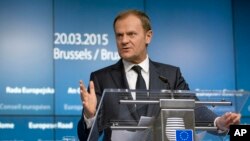European leaders said they would work to enforce stability just across the Mediterranean in Tunisia and Libya, even as they moved on to other problems, pushing debt-burdened Greece on reforms and agreeing to keep sanctions against Russia.
They announced the initiatives at the conclusion of a two-day summit in Brussels.
With Tunisia still reeling from this week's terrorist attacks, European Union president Donald Tusk said the 28-member block will offer aid and cooperation to help the North African country shore up security. EU leaders also discussed ways to help stabilize conflict-torn Libya right next door — calling for a rapid cease-fire and a government of national unity there. In both cases, Tusk said, there is no easy fix.
"I'm not sure we have a short-term solution for Libya or Tunisia, or other countries of the region for the terrorism problem. The situation is much more complex than ever before. My [guess] is that we have to avoid this desire to find a spectacular and simple solution without substantial results," said the former Polish prime minister, who now heads the European Council.
Tusk said Tunisia may well be the next focus of the Islamic State group which claimed responsibility for the attacks at a Tunis museum this week. Nearly two dozen people were killed, including many Europeans. The EU also wants stability in the region because it's worried migrants are using Libya as a jumping off point to cross the Mediterranean to Europe.
Tusk spoke at a press conference Friday, after EU leaders wrapped up a two-day meeting that also addressed the Greek debt crisis and the conflict in Ukraine.
On Greece, leaders pushed Prime Minister Alexis Tsipras to come up with more reforms if the country is to get more bailout funds.
Tusk called the talks a "reality check."
"When I used this word reality check, in fact I mean both — not both because it was 5-6 parties in this meeting — all of them understand much better that trust is the foundation in this very complex process of negotiations," said Tusk. "I'm quite satisfied after this meeting, because for sure today the perspective of our common work … will be much easier because we are more realistic and more trustful."
On Ukraine, EU leaders agreed to maintain sanctions against Russia until a peace agreement in eastern Ukraine is fully implemented.












